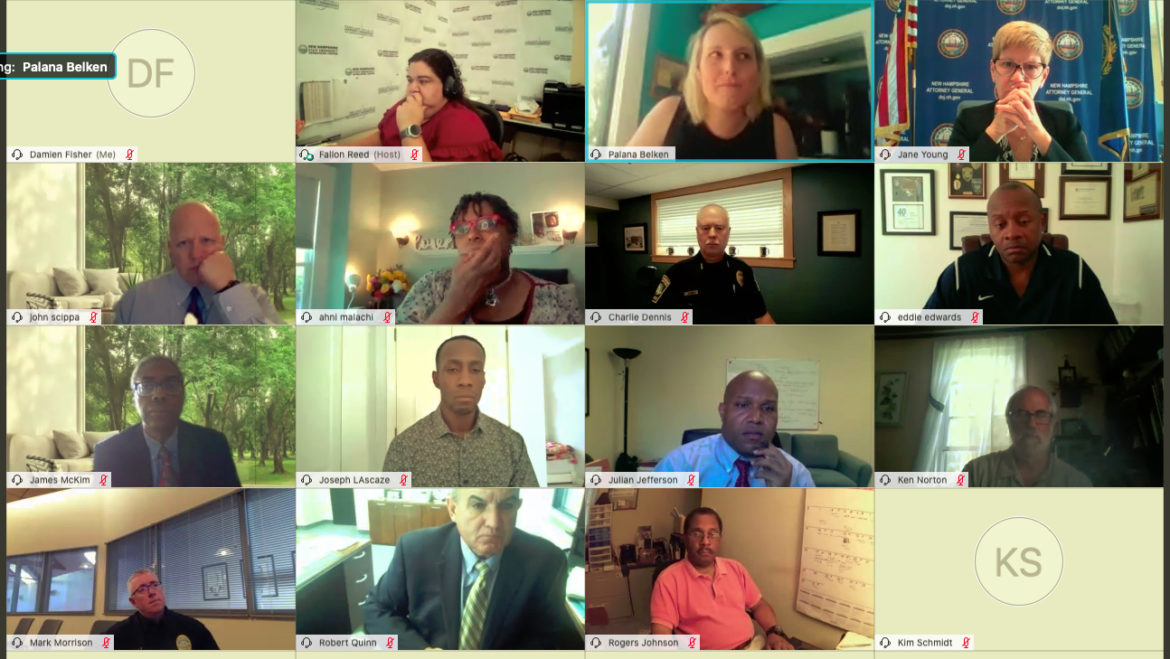By DAMIEN FISHER, InDepthNH.org
CONCORD — Police need to find a way to keep better records on interactions with members of the public as the New Hampshire Commission on Law Enforcement Accountability, Community and Transparency starts looking at community relations.
The commission met Monday morning to begin work on police interactions with the public, finding there is not a single way to track those interactions and share that data.
“I want better record keeping by law enforcement,” said Stephanie Hausman, a defense attorney who gave testimony before the commission.
Hausman spoke about two of her clients, African American women, who were stopped by a State Police trooper and frisked. Hausman said that after she dug for records she found that out of the 34 most recent stops, that trooper frisked four people, three who were people of color. The one white person was frisked after he reportedly told the trooper he had a weapon.
“I’m sure this officer would say that he is not racist. But from this small dataset, it is clear that he views brown people as being more of a threat,” Hausman said in her written statement. “That view, even if held unconsciously, has real-world consequences for the people of color he interacts with.”
Getting better data on stops and other interactions is crucial to the commission moving forward, said James McKim, president of the Manchester chapter of the NAACP and a commission member.
“We’re being tasked with developing better reporting,” McKim said.
Police in New Hampshire do not have a universal records management system that captures all of the possible data on police and public interactions, according to John Scippa, executive director of the Police Standards and Training Council and a commission member.
“It’s a huge undertaking,” he said.
Scippa said he does not have a lot of data that he should have. The Police Standards and Training Council doesn’t have data on police officer demographics, it does not have a data collections system to track if officers have completed online training, and it does not have a data collection system to track when individual police officers move to different departments, Scippa said.
“On my side of the house, that is an absolute necessity,” Scippa said.
Scippa said the state’s 2019 audit of the Police Standards and Training Council recommended a software upgrade to allow for better data reporting, but that upgrade has yet to be funded by the state.
Some of New Hampshire’s more than 200 individual law enforcement agencies use different software to track public interactions, usually the radio dispatch reporting software. That information isn’t always complete though, according to commission members. Racial and ethnic information about a person involved in a traffic stop is not always reported in the data. Oftentimes it is left up to the individual officer to determine.
The commission members want to investigate having racial and ethnic information added to New Hampshire driver’s licenses to allow police to capture that data for the reports, and make data analysis possible on the way officers interact with minorities.
“If an officer’s making a stop and taking your license, they’re getting everything else,” said Ahni Malachi, executive director of the New Hampshire Human Rights Commission and member of the New Hampshire Commission on Law Enforcement Accountability.
Adding that information to the state drivers license could require changes to state law, according to Safety Department Commissioner Robert Quinn.
The commission is working to present Gov. Chris Sununu with recommendations on police/community relations and police discipline by the end of the month. The commission plans to meet multiple times a week in order to get the work done.
Monday’s meeting started with a change to the minutes regarding Commissioner Joseph Lascaze’s statement about his criminal background which was made Friday. Lascaze said Friday he had spoken to a reporter about a forthcoming story, when in fact he had not.
The minutes were changed to reflect that Lascaze was contacted by a reporter. Lascaze did not respond to InDepth.NH.org last week, but instead made the public comments at Friday’s commission meeting.





